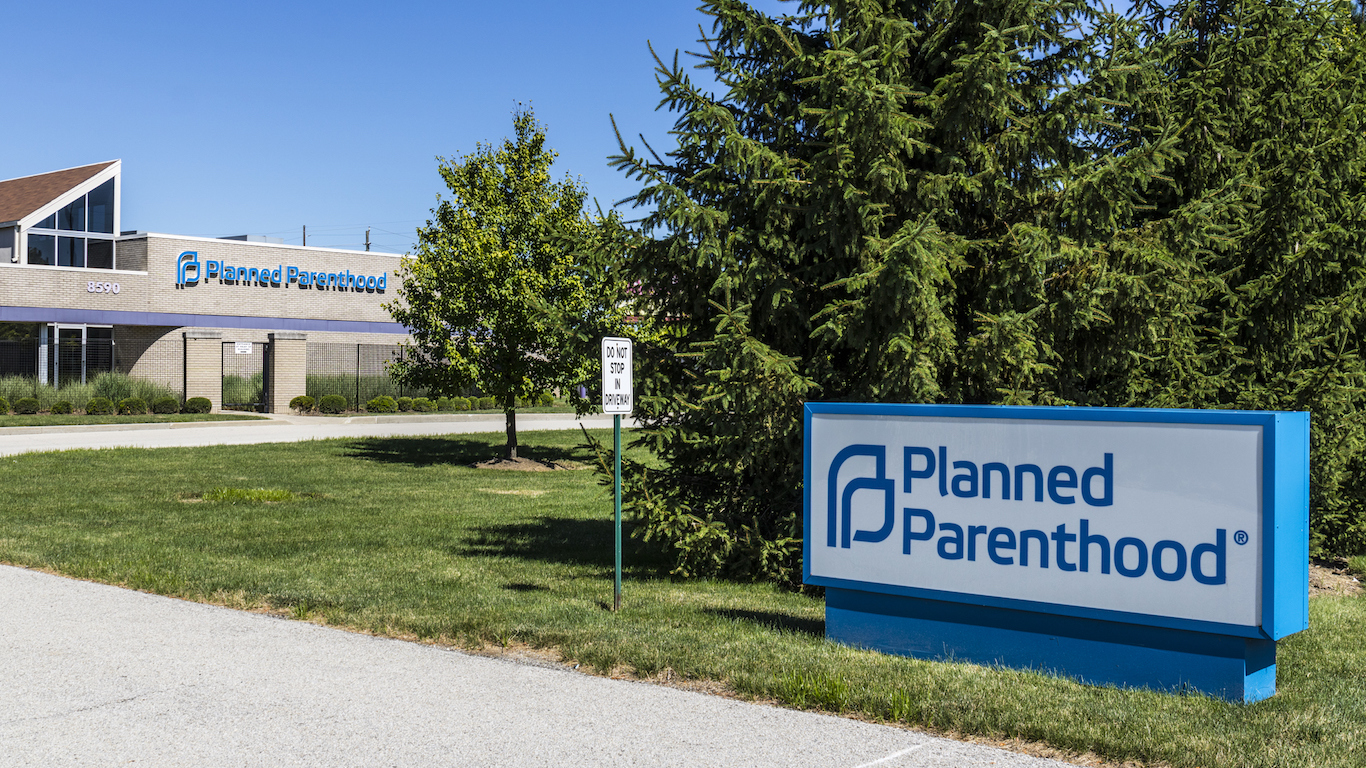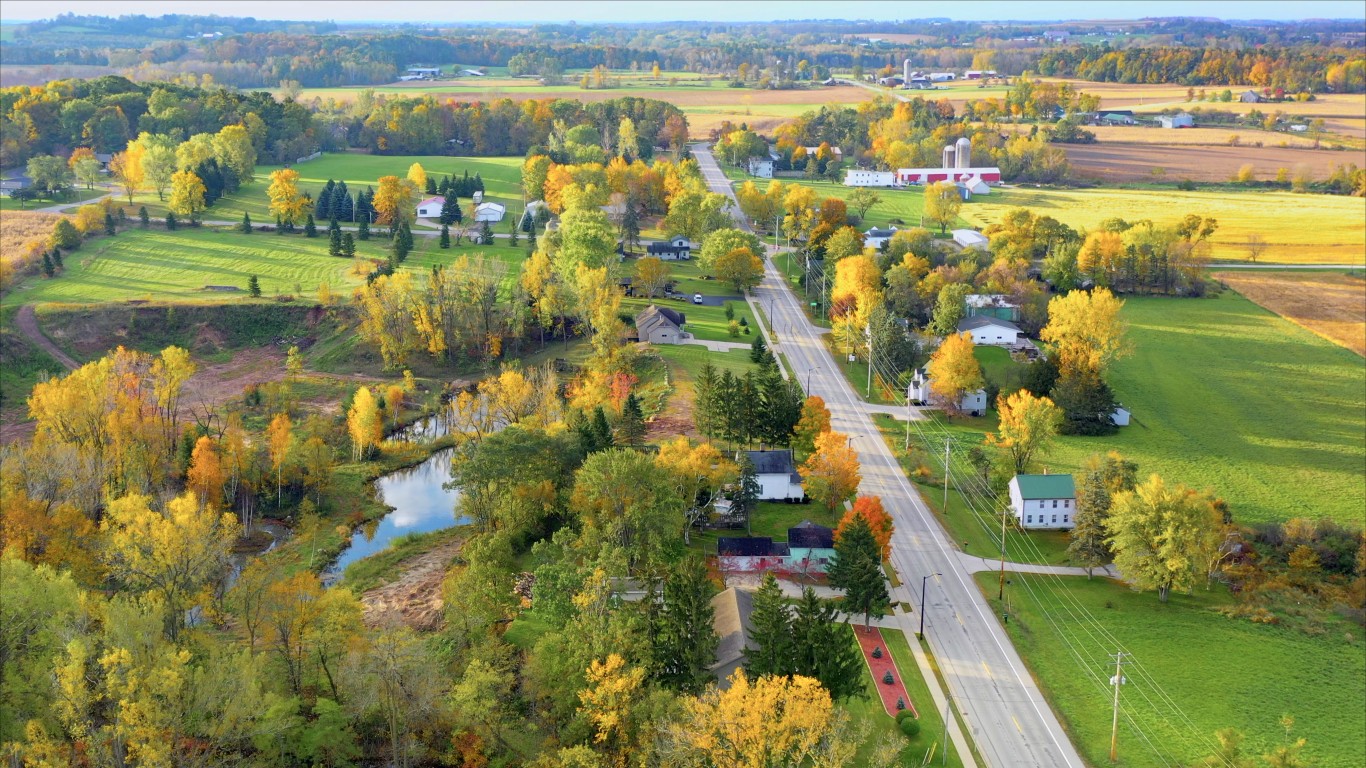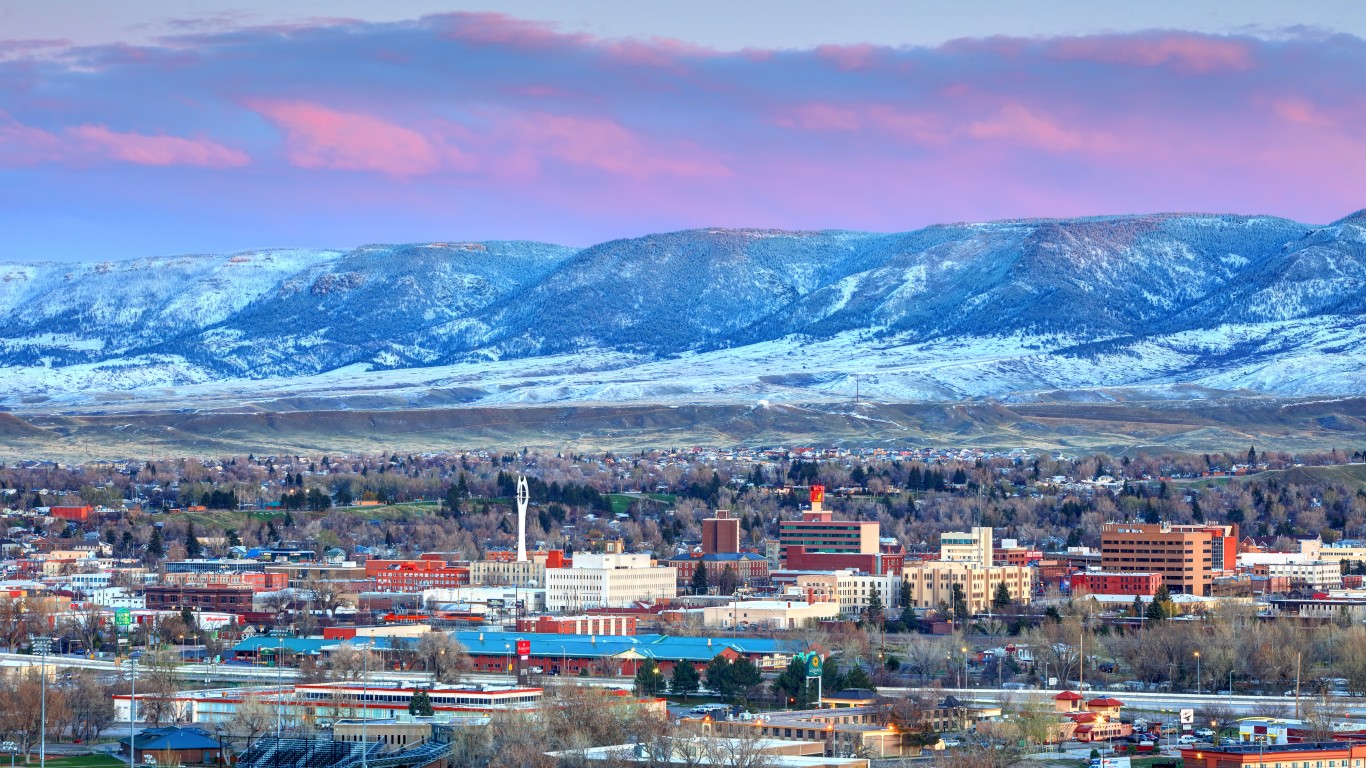Special Report
The 34 States Where Abortion Has Been Inaccessible Since 1976

Published:
Last Updated:

The recent Supreme Court decision to overturn Roe v. Wade eliminated constitutional protections to abortion access and has left millions of American women without this right in states where abortions are now illegal. Even before this monumental shift, abortion has been a contentious political issue – and most states have had strong legal restrictions in place for decades.
In 1976, the United States Congress enacted the Hyde Amendment, which prohibits the use of Medicaid to fund abortion services. Because Medicaid is a government-funded health insurance program for low-income Americans, the Hyde Amendment effectively restricted abortion access for the most economically vulnerable Americans.
While some states have enacted policies to fund abortion services for Medicaid recipients, the vast majority have not. 24/7 Wall St. reviewed Medicaid laws across the U.S. to identify the 34 states where abortion access has been restricted since 1976.
Though it is not a permanent law, the Hyde Amendment is a rider to the Congressional appropriations bill and is renewed annually by the legislature. Since 1994, the amendment has included exceptions that allow for abortion access in cases of rape, incest, or if a pregnancy endangers the parent’s life. (Here is a look at the worst states for health care.)
The 16 states that do allow for Medicaid-funded abortions are concentrated in the Northeast and along the West Coast – though there are a handful, including Illinois and New Mexico, in other parts of the country.
The states that offer no countermeasures to the Hyde Amendment are home to a total of 46.3 million women of reproductive age – defined by the World Health Organization as between 15 and 49 years – as well 46.1 million Medicaid recipients. (Here is a look at the worst states for women.)
Click here to see the 34 states where abortion has been inaccessible since 1976.
Click here to see our detailed methodology.

Alabama
> Medicaid enrollment: 18.7% of pop. – 10th lowest (916,374 people)
> Women of reproductive age: 22.7% of pop. – 19th highest (1,110,988 people)
> Total population: 4,893,186
[in-text-ad]

Arizona
> Medicaid enrollment: 28.4% of pop. – 13th highest (2,040,517 people)
> Women of reproductive age: 22.3% of pop. – 24th lowest (1,596,478 people)
> Total population: 7,174,064

Arkansas
> Medicaid enrollment: 31.4% of pop. – 7th highest (945,341 people)
> Women of reproductive age: 22.3% of pop. – 24th highest (672,787 people)
> Total population: 3,011,873

Colorado
> Medicaid enrollment: 28.4% of pop. – 14th highest (1,616,098 people)
> Women of reproductive age: 23.6% of pop. – 5th highest (1,339,182 people)
> Total population: 5,684,926
[in-text-ad-2]

Delaware
> Medicaid enrollment: 28.6% of pop. – 12th highest (276,341 people)
> Women of reproductive age: 21.7% of pop. – 10th lowest (210,273 people)
> Total population: 967,679

Florida
> Medicaid enrollment: 21.1% of pop. – 15th lowest (4,476,192 people)
> Women of reproductive age: 21.4% of pop. – 6th lowest (4,540,909 people)
> Total population: 21,216,924
[in-text-ad]

Georgia
> Medicaid enrollment: 19.4% of pop. – 12th lowest (2,036,716 people)
> Women of reproductive age: 24.1% of pop. – 3rd highest (2,531,208 people)
> Total population: 10,516,579

Idaho
> Medicaid enrollment: 21.6% of pop. – 16th lowest (378,524 people)
> Women of reproductive age: 22.2% of pop. – 22nd lowest (389,386 people)
> Total population: 1,754,367

Indiana
> Medicaid enrollment: 26.0% of pop. – 23rd highest (1,741,067 people)
> Women of reproductive age: 22.6% of pop. – 20th highest (1,511,759 people)
> Total population: 6,696,893
[in-text-ad-2]

Iowa
> Medicaid enrollment: 23.4% of pop. – 22nd lowest (736,339 people)
> Women of reproductive age: 21.7% of pop. – 12th lowest (684,685 people)
> Total population: 3,150,011

Kansas
> Medicaid enrollment: 14.0% of pop. – 4th lowest (408,718 people)
> Women of reproductive age: 22.1% of pop. – 17th lowest (643,059 people)
> Total population: 2,912,619
[in-text-ad]

Kentucky
> Medicaid enrollment: 31.7% of pop. – 6th highest (1,414,385 people)
> Women of reproductive age: 22.3% of pop. – 25th lowest (993,733 people)
> Total population: 4,461,952

Louisiana
> Medicaid enrollment: 35.6% of pop. – 2nd highest (1,660,576 people)
> Women of reproductive age: 22.9% of pop. – 14th highest (1,069,230 people)
> Total population: 4,664,616

Michigan
> Medicaid enrollment: 28.0% of pop. – 15th highest (2,788,790 people)
> Women of reproductive age: 22.0% of pop. – 15th lowest (2,194,320 people)
> Total population: 9,973,907
[in-text-ad-2]

Mississippi
> Medicaid enrollment: 22.0% of pop. – 19th lowest (656,864 people)
> Women of reproductive age: 23.0% of pop. – 11th highest (685,646 people)
> Total population: 2,981,835

Missouri
> Medicaid enrollment: 19.3% of pop. – 11th lowest (1,181,462 people)
> Women of reproductive age: 22.2% of pop. – 23rd lowest (1,362,137 people)
> Total population: 6,124,160
[in-text-ad]

Nebraska
> Medicaid enrollment: 16.7% of pop. – 7th lowest (321,961 people)
> Women of reproductive age: 22.1% of pop. – 20th lowest (425,952 people)
> Total population: 1,923,826

Nevada
> Medicaid enrollment: 26.3% of pop. – 21st highest (798,019 people)
> Women of reproductive age: 22.8% of pop. – 17th highest (691,806 people)
> Total population: 3,030,281

New Hampshire
> Medicaid enrollment: 16.1% of pop. – 6th lowest (217,660 people)
> Women of reproductive age: 21.4% of pop. – 5th lowest (289,670 people)
> Total population: 1,355,244
[in-text-ad-2]

North Carolina
> Medicaid enrollment: 18.6% of pop. – 9th lowest (1,929,836 people)
> Women of reproductive age: 23.1% of pop. – 9th highest (2,398,192 people)
> Total population: 10,386,227

North Dakota
> Medicaid enrollment: 15.4% of pop. – 5th lowest (117,385 people)
> Women of reproductive age: 22.0% of pop. – 16th lowest (167,627 people)
> Total population: 760,394
[in-text-ad]

Ohio
> Medicaid enrollment: 25.6% of pop. – 24th highest (2,990,681 people)
> Women of reproductive age: 22.1% of pop. – 18th lowest (2,577,743 people)
> Total population: 11,675,275

Oklahoma
> Medicaid enrollment: 26.7% of pop. – 18th highest (1,053,579 people)
> Women of reproductive age: 22.5% of pop. – 22nd highest (888,232 people)
> Total population: 3,949,342

Pennsylvania
> Medicaid enrollment: 26.4% of pop. – 20th highest (3,383,595 people)
> Women of reproductive age: 21.7% of pop. – 13th lowest (2,781,360 people)
> Total population: 12,794,885
[in-text-ad-2]

Rhode Island
> Medicaid enrollment: 29.5% of pop. – 9th highest (311,787 people)
> Women of reproductive age: 22.9% of pop. – 15th highest (241,982 people)
> Total population: 1,057,798

South Carolina
> Medicaid enrollment: 22.0% of pop. – 18th lowest (1,121,526 people)
> Women of reproductive age: 22.4% of pop. – 23rd highest (1,141,545 people)
> Total population: 5,091,517
[in-text-ad]

South Dakota
> Medicaid enrollment: 13.5% of pop. – 3rd lowest (118,993 people)
> Women of reproductive age: 21.0% of pop. – 3rd lowest (184,781 people)
> Total population: 879,336

Tennessee
> Medicaid enrollment: 23.1% of pop. – 20th lowest (1,563,239 people)
> Women of reproductive age: 22.9% of pop. – 16th highest (1,547,645 people)
> Total population: 6,772,268

Texas
> Medicaid enrollment: 16.9% of pop. – 8th lowest (4,826,858 people)
> Women of reproductive age: 24.1% of pop. – 2nd highest (6,895,879 people)
> Total population: 28,635,442
[in-text-ad-2]

Utah
> Medicaid enrollment: 13.2% of pop. – 2nd lowest (416,132 people)
> Women of reproductive age: 24.5% of pop. – the highest (773,607 people)
> Total population: 3,151,239

Virginia
> Medicaid enrollment: 20.0% of pop. – 13th lowest (1,699,387 people)
> Women of reproductive age: 23.1% of pop. – 8th highest (1,968,054 people)
> Total population: 8,509,358
[in-text-ad]

West Virginia
> Medicaid enrollment: 32.3% of pop. – 5th highest (583,362 people)
> Women of reproductive age: 20.9% of pop. – 2nd lowest (377,583 people)
> Total population: 1,807,426

Wisconsin
> Medicaid enrollment: 21.8% of pop. – 17th lowest (1,267,289 people)
> Women of reproductive age: 21.7% of pop. – 11th lowest (1,262,031 people)
> Total population: 5,806,975

Wyoming
> Medicaid enrollment: 11.9% of pop. – the lowest (69,024 people)
> Women of reproductive age: 21.4% of pop. – 7th lowest (124,687 people)
> Total population: 581,348
Methodology
To identify the states where abortion has been inaccessible to low-income Americans, 24/7 Wall St. identified the states where women cannot use Medicaid coverage to pay for an abortion.
Medicaid enrollment statistics are from the federal government and are current as of March 2022. The number of women who are of reproductive age – defined by the World Health Organization as ages 15 to 49 – are five-year estimates from the U.S. Census Bureau’s 2020 American Community Survey. Overall population figures are also from the ACS.
Are you ahead, or behind on retirement? For families with more than $500,000 saved for retirement, finding a financial advisor who puts your interest first can be the difference, and today it’s easier than ever. SmartAsset’s free tool matches you with up to three fiduciary financial advisors who serve your area in minutes. Each advisor has been carefully vetted and must act in your best interests. Start your search now.
If you’ve saved and built a substantial nest egg for you and your family, don’t delay; get started right here and help your retirement dreams become a retirement reality.
Thank you for reading! Have some feedback for us?
Contact the 24/7 Wall St. editorial team.